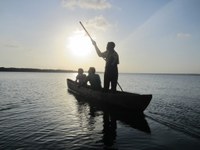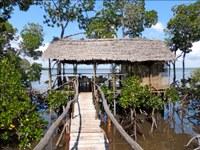Why Knowledge Management is Vital for the COAST Project Success
What is Knowledge Management?
There are as many definitions for Knowledge Management as there are organizations, and there is still no consensus yet on the most effective way to define ‘KM’ (a popularly used synonym). While some institutions define KM to be about systems and technologies, others have defined KM to be about people, processes and learning organizations/systems. This complex interplay of organizational features however all have some indication of what KM actually means, but it varies from one organization to the other.

Some UN agencies (UNICEF, UNDP) have defined KM as "an integrated, systematic approach to identifying, managing and sharing an organization’s knowledge, and enabling groups of people to create new knowledge collectively in order to achieve the objectives of the organization". Such a definition tries to broaden the operational scope of KM to include human knowledge (intelligence) inherent within the organization. The Global Environmental Facility (GEF) on its part defines Knowledge Managements as a ‘ …set of specific actions developed (gathering data, analyzing processes, results and personal experiences, capturing and sharing lessons learned) so that the knowledge of an individual or an institution reaches, in a timely manner, the largest number of people who can benefit from it…’ (GEF KMI 2011).
How is KM applied in different institutions?
Since Knowledge Management is still new and evolving, its definition is still quite ambiguous. However, most institutions have adopted one or more components of what KM is and are applying it to enhance operational efficiency, improved documentation, measurement of results and information sharing. Other institutions have mainstreamed KM into their critical strategy documents to drive corporate ‘turnaround’. For instance, UNIDO’s Knowledge Management Strategy Paper, seeks to apply its KM Strategy as a pathway to transforming the institution from “..a multi-platform, silo-based Knowledge Management environment to a future-proof, single-platform and collaboration-oriented knowledge-based organization.” KM therefore seeks to respond to the different needs and targets of various Organizations/Institutions for improved results.
For instance, private sector institutions value a KM definition/model that could enhance productivity resulting in improved profit margins and general effectiveness. Government institutions could value KM models that result in improved service delivery, accountability and resourcefulness of its citizenry. For development institutions, and in this case the United Nations agencies such as UNIDO, UNEP and UNWTO, knowledge platforms resulting in improved capabilities to drive societal change and spur innovative actions for sustainable development would be more practical and sound.
KM in the context of the COAST Project: What to expect in Project Implementation?
 In the context of the COAST Project, and as we move to implement the recommendations of the Mid Term Evaluation, a strategic shift has taken place to adopt a KM Strategy that will focus on capturing and disseminating knowledge, best practices and lessons learned coming out of the COAST project. The Strategy aims to develop and implement appropriate activities to foster a new level of engagement with all coastal tourism stakeholders involved in this project at the local, national and international levels. This Strategy will seek to assist the partner countries to strengthen the integration and impact of the project objectives and activities, as well as to feed key outputs into local, national and international policies and practices.
In the context of the COAST Project, and as we move to implement the recommendations of the Mid Term Evaluation, a strategic shift has taken place to adopt a KM Strategy that will focus on capturing and disseminating knowledge, best practices and lessons learned coming out of the COAST project. The Strategy aims to develop and implement appropriate activities to foster a new level of engagement with all coastal tourism stakeholders involved in this project at the local, national and international levels. This Strategy will seek to assist the partner countries to strengthen the integration and impact of the project objectives and activities, as well as to feed key outputs into local, national and international policies and practices.
The lessons learned and best practice case studies, as well as know-how on appropriate processes and concrete recommendations for improving the environment and coastal management will be repackaged into different knowledge management tools. Our KM Strategy will be implemented using an array of knowledge management tools and approaches (i.e. written and visual materials such as Newsletters, fact sheets, exposes and reports etc). These tools and approaches will engage global and country-based media agencies, the respective Ministries of Tourism and Environment in the partner countries, locally-based coastal tourism stakeholders and the communities surrounding the COAST project activities.
The Strategy intends to thereby generate increased public awareness and demand for actions to prevent, and control the degradation of marine and coastal ecosystems from potential pollution and contamination.
Knowledge Management Result Areas for the COAST Project
The COAST Project Knowledge Management Strategy will have four main result areas, as summarized in the table below:
|
Knowledge Management Result Areas for the COAST Project |
|
THEME 1: COASTAL BEST PRACTICES AND TECHNOLOGIES – These KM products will document some of the best practices and processes within the three main thematic areas of the COAST Project (EMS, Eco-tourism, Reef and Marine Recreation Management) emerging from the COAST Demo Sites. It will focus on showcasing some of the demonstrated localized BAP/BATs. The portrayal of the best practices will contain comprehensive information on the various processes and technologies being applied in the respective local realities. |
|
THEME 2: COASTAL LOCAL VOICES – This COAST KM result area will focus on documenting the impacts of the project within, as well as to the local communities. It will entail following up with project leaders, beneficiaries and communities in all the countries and capturing their voices to provide a human account of how their interactions with the project have improved their livelihood. This will use participatory methodologies and approaches to ensure we document the human stories of sustainable coastal tourism in Africa. |
|
THEME 3: COASTAL ENVIRONMENTAL ECONOMIC DYNAMICS – The coastal ecosystem is very valuable to the countries we work in. Hence this KM result area will seek to document the value of our work in real economic terms. This KM result area will give a special emphasis to the private sector players and how implementation of COAST project themes (RMRM, EMS, Eco-Tourism including Small and Medium Enterprise (SME) developments) is contributing to improved results. It is expected that the Private sector players will drive the work to ensure long-term sustainability. |
|
THEME 4: COASTAL POLICY CHANGE PROCESSES – The COAST Project KM Strategy will seek to identify some of the policy interventions emerging and those that are needed to enhance sustainable coastal tourism at national, regional and global levels. These will closely follow the Sustainable Tourism Governance work being driven by UNWTO and UNIDO under the COAST Project. |
Conclusion
The role of a sound Knowledge Management and Communication Strategy to the COAST Project is now more than ever before of critical importance for sustained delivery. With the four KM themes of Coastal Best Practices and Technologies; Coastal Local Voices; Coastal Environmental Economic Dynamics; and Coastal Policy Change processes, the COAST Project will generate useful products that will inform public discourse in the area of sustainable tourism in Africa and to be able to contribute to the ongoing global dialogue on the same. It is hoped that the lessons learned and know-how coming out of the COAST Project will be transformed into specific recommendations that have the potential to serve as valuable contributions and inputs to the respective national Tourism and Environment strategies, policies and practices and to future similar project initiatives. In this way, the COAST Project will be able to contribute to policy changes in tourism practices and inspire replications and spin off projects through this KM Strategy.
By Geoffrey Omedo,
Knowledge Management and Communications Officer



















